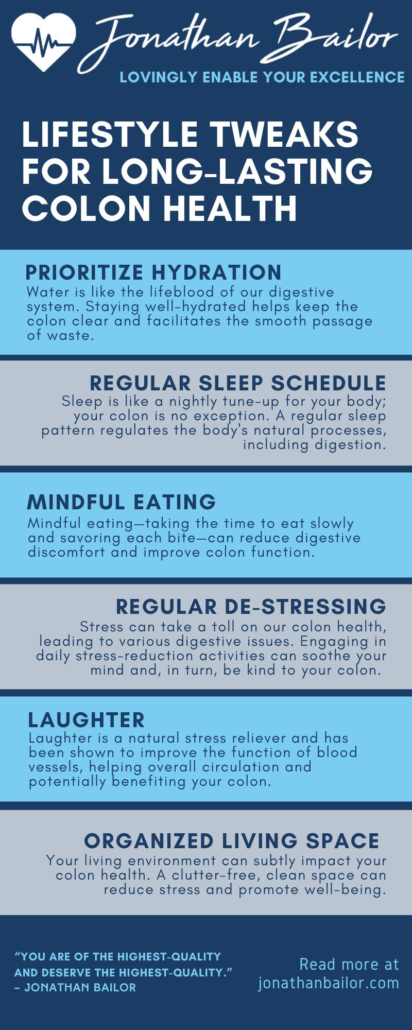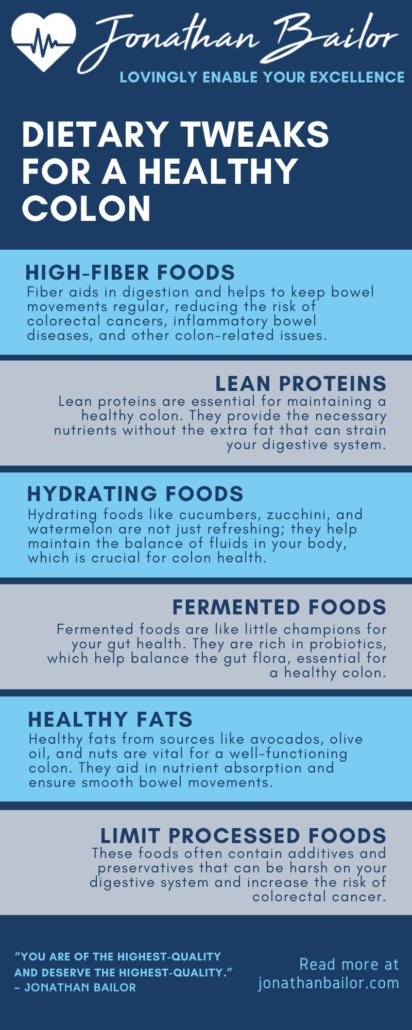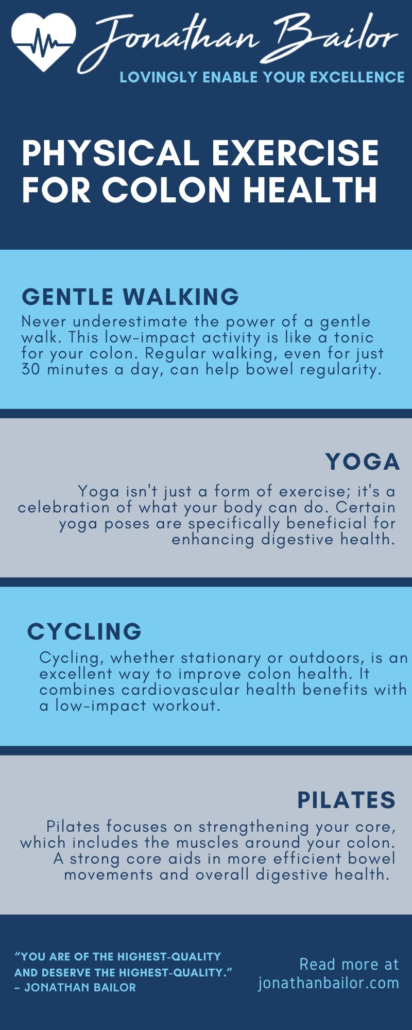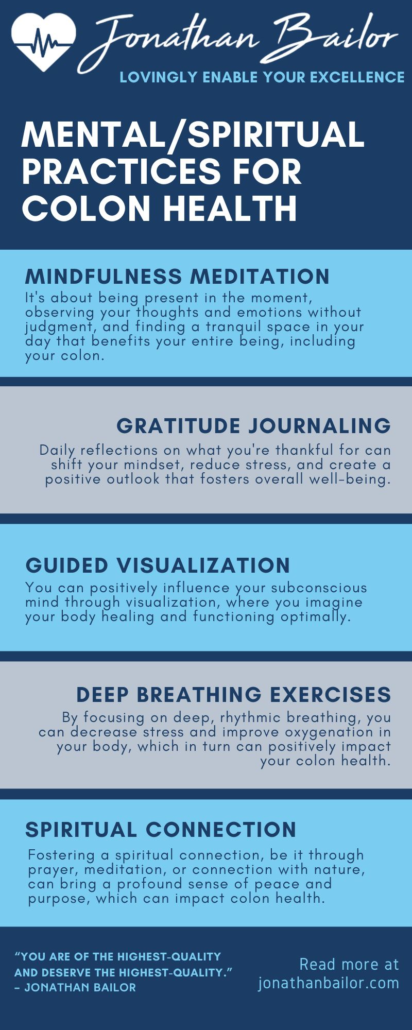21 Daily Habits that Promote Colon Health
In our journey toward a healthier life, it’s crucial to remember that wellness doesn’t just reside in the heart, mind, or muscles. This Colon Health Guide by Jonathan Bailor is designed to extend your idea of wellness to often overlooked areas, like our colon. You might not think about your colon often, but this unsung hero plays a pivotal role in your overall health. It’s about time we gave it the attention it deserves!
Check out our 12 Best Colon-Cleansing Foods to Add to Your Diet and 20 Easy Daily Habits to Enhance Your Colon Health guides next!
Now, the topic of colon health can seem daunting or even a bit, well, unglamorous. But here’s the thing: taking steps to keep your colon healthy isn’t just for your well-being; it’s a gift to your future self. And guess what? It’s not as complex as you might think. There are simple, daily habits that can make a significant difference. These aren’t just any habits; they’re actions you can easily integrate into your day without needing to turn your life upside down.
Imagine feeling more energetic, lighter, and even happier—just by tweaking small aspects of your everyday routine. It’s like finding hidden treasures in the simplicity of your daily life. These habits aren’t just about avoiding discomfort or issues down the road; they’re about embracing a lifestyle that nourishes and cherishes your body in every possible way.
But why is this conversation about keeping your colon healthy so important? Well, it’s because your colon is more than just a part of your digestive system. It’s a cornerstone of your body’s ability to absorb nutrients, dispose of waste, and even influence your mood. Yes, your mood! There’s a whole world of activity happening in our guts that impacts how we feel day-to-day.
Now, before we get into the nitty-gritty of these life-enhancing habits, let’s clear something up. This isn’t about a one-size-fits-all solution. Each of us has a unique body, lifestyle, and needs. So, as you read through these habits, think about how they can mold into your life. It’s like having a personal toolkit for colon health tailored just for you.
And here’s the best part: sharing these tips with friends and family can not only uplift their health but also bring you closer. It’s about creating a community of wellness where we support and encourage each other in our health journeys. When you share something as valuable as the key to better health, you’re not just passing on information but spreading well-being and love.
So, are you ready to embark on this journey with me? Let’s step forward together, embracing these simple yet powerful daily habits that will light up our path to a healthier, happier colon. And remember, this is about taking small steps today for a vibrant and flourishing tomorrow!
Elevating Colon Health: Simple Lifestyle Tweaks for Long-lasting Wellness
Transitioning towards a healthier colon doesn’t always require drastic diet changes or intense physical activity. Sometimes, it’s the subtle shifts in our everyday lifestyle that can have the most profound impact. These changes are like quiet guardians of our well-being, seamlessly integrating into our daily lives to foster a happier, healthier gut.
Let’s explore a few lifestyle adjustments that, while simple, can significantly enhance your colon health.
1. Prioritize Hydration: The Unsung Hero of Digestive Health
Water is like the lifeblood of our digestive system. Staying well-hydrated helps keep the colon clear and facilitates the smooth passage of waste. It’s like giving your colon a gentle, continuous cleanse every day. Try to keep a water bottle handy, perhaps infusing it with a slice of lemon or cucumber for extra zest, making hydration healthy and enjoyable.
2. Embrace a Regular Sleep Schedule: The Rhythm of Restorative Rest
Sleep is like a nightly tune-up for your body; your colon is no exception. A regular sleep pattern regulates the body’s natural processes, including digestion. By establishing a consistent bedtime routine and aiming for 7-8 hours of quality sleep, you’re not just resting your body but rejuvenating your colon.
3. Mindful Eating: A Symphony of Thoughtful Consumption
The pace and environment in which we eat can directly affect our digestive health. Mindful eating—taking the time to eat slowly and savoring each bite—can reduce digestive discomfort and improve colon function. It’s like each meal becomes a moment of connection between you and your body, enhancing your physical and mental well-being.
4. De-stress Regularly: The Art of Letting Go
Stress can take a toll on our colon health, leading to various digestive issues. Engaging in daily stress-reduction activities, such as deep breathing, listening to calming music, or even a leisurely walk, can soothe your mind and, in turn, be kind to your colon. It’s like sending a signal of calm and care to every part of your body.
5. Laughter: The Joyous Medicine
Never underestimate the power of a good laugh! Laughter is a natural stress reliever and has been shown to improve the function of blood vessels, helping overall circulation and potentially benefiting your colon. It’s like a mini-workout for your insides, bringing joy and health in equal measure.
6. Maintaining a Clean and Organized Living Space: Harmonious Surroundings
Your living environment can subtly impact your colon health. A clutter-free, clean space can reduce stress and promote well-being. It’s about creating an external environment that reflects the internal harmony you wish to achieve in your body, including your colon.
By weaving these simple practices into the fabric of your daily life, you’re not just making changes for your colon’s sake but uplifting your overall quality of life. It’s about embracing a holistic approach to wellness, where every little aspect of your lifestyle harmoniously contributes to your health.
Remember, it’s the small, consistent steps that pave the way to lasting wellness.

Feeling Better Is Priceless, That's Why We Don't Put A Price On It!
“It’s Like A Free and Medically Valid Version of Noom and Weight Watchers Online”
~ Dr. Doctor Matthew Oleshiak, MD
Click the 'LEARN MORE' button below for free lifetime access to the fast fix program developed by Jonathan and top Ivy League Medical Doctors
LEARN MOREP.S. It's not a free trial. It's not part of the program for free. The entire program is free, forever, for real! No credit card needed.
Nourishing Your Colon: Diet Tweaks for a Healthier You
When it comes to nurturing our colon, the adage ‘you are what you eat’ rings particularly true. The foods we consume play a pivotal role in maintaining the health of our digestive system. Think of your diet as a nurturing ground; the right ingredients can help your colon flourish in ways you never imagined.
Let’s dive into some dietary changes and healthy foods that are both practical and effective in boosting colon health. These aren’t about restrictive eating; they’re about making mindful choices that not only please your palate but also love your gut.
1. Embrace a High-Fiber Diet of Vegetables and Fruits—Nature’s Cleansers
Incorporating a variety of fiber-rich fruits and vegetables into your diet is like giving your colon a gentle, natural brush. Fiber aids in digestion and helps to keep bowel movements regular, reducing the risk of colorectal cancers, inflammatory bowel diseases, and other colon-related issues. A lack of dietary fiber is one of the primary risk factors for colon cancer. In fact, low-fiber diets have been linked to an increased risk of colon cancer.
Think of vibrant berries, leafy greens, and crunchy carrots for your fiber intake. Each bite is packed with fiber, flavor, and a bounty of nutrients, making every meal a step toward a happier colon.
2. Lean Proteins: The Building Blocks of a Healthy Gut
Lean proteins are essential for maintaining a healthy colon. They provide the necessary nutrients without the extra fat that can strain your digestive system.
Options like grilled chicken, turkey, fish, and plant-based proteins like lentils and chickpeas are not only delicious but also kind to your colon. Each meal becomes a balance of taste and nutrition, supporting your digestive health.
3. Hydrating Foods: The Essence of Digestive Ease
Incorporate hydrating foods into your diet to aid digestion and facilitate easier waste passage. Foods like cucumbers, zucchini, and watermelon are not just refreshing; they help maintain the balance of fluids in your body, which is crucial for colon health.
It’s like quenching your body’s thirst from the inside out, keeping your colon naturally hydrated and functioning smoothly.
4. Fermented Foods: The Probiotic Powerhouses
Fermented foods are like little champions for your gut health. They are rich in probiotics, which help balance the gut flora, essential for a healthy colon. Yogurt, kefir, sauerkraut, and kimchi are not just culinary delights; they’re also packed with good bacteria that promote a healthy digestive system. It’s like having a team of tiny helpers keeping your colon happy.
5. Healthy Fats: The Smooth Operators
Healthy fats from sources like avocados, olive oil, and nuts are vital for a well-functioning colon. They aid in nutrient absorption and ensure smooth bowel movements.
Including these in your diet is like providing a lubricant for your digestive system, ensuring everything moves along smoothly without any hiccups.
6. Limit Processed Foods: Minimizing the Strain
Reducing the intake of heavily processed foods can significantly benefit your colon health. These foods often contain additives and preservatives that can be harsh on your digestive system and increase the risk of colorectal cancer. Processed meats are especially bad for your health.
By choosing whole, minimally processed foods, you’re giving your colon the chance to process nutrients without the extra strain.
Remember, these dietary adjustments are about creating a harmonious relationship between what you eat and your colon’s health. It’s about making choices that not only satisfy your taste buds but also contribute to your overall well-being. With each mindful meal, you’re taking a step towards a healthier, more vibrant you.

Energizing Your Colon: Physical Activities for Enhanced Digestive Health
The harmony between our physical activities and our colon’s well-being is a dance of health that often goes unnoticed. Just like the right nutrients nourish our body, the right kind of physical activity can invigorate our digestive system, particularly our colon. These activities aren’t about high-intensity workouts or exhausting regimens. Instead, they are gentle, enjoyable, and perfectly tailored to enhance your colon’s health.
Let’s explore some physical activities that are not only manageable but can also make a significant difference in supporting a healthy digestive system.
1. Gentle Walking: The Simple Step Forward
Never underestimate the power of a gentle walk. This low-impact activity is like a tonic for your colon. Regular walking, even for just 30 minutes a day, can help improve bowel regularity. It’s a natural, easy way to stimulate your digestive system, and it’s something you can do anywhere, whether it’s a stroll through your neighborhood or a walk in the park.
2. Yoga: The Art of Stretching and Soothing
Yoga isn’t just a form of exercise; it’s a celebration of what your body can do. Certain yoga poses are specifically beneficial for enhancing digestive health. Poses like the Pavanamuktasana (Wind-Relieving Pose) or the Trikonasana (Triangle Pose) gently massage your abdominal organs, promoting movement and relief. It’s a way of connecting with your body while helping to promote good colon health.
3. Cycling: The Joyous Journey on Two Wheels
Cycling, whether stationary or outdoors, is an excellent way to improve colon health. It combines cardiovascular health benefits with a low-impact workout. When you cycle, you engage your legs and core, which indirectly stimulates your colon, aiding in smoother digestion.
It’s not just about reaching a destination; it’s about enjoying the journey and doing something great for your body.
4. Pilates: The Core of Colon Health
Pilates is like a friend that gently pushes you to do better. It focuses on strengthening your core, which includes the muscles around your colon. A strong core aids in more efficient bowel movements and overall digestive health. It’s a practice that brings strength and mobility not just to your muscles but to your digestive system as well.
Incorporating these activities into your routine isn’t about taking huge strides; it’s about taking small steps that lead to big changes in your digestive and colon health. Each of these activities offers a unique way to support your colon, bringing together the joy of movement with the benefits of a healthy digestive system.
Remember, it’s about finding joy in the activity and celebrating the health benefits that come along with it.

Cultivating Inner Wellness: Mental and Spiritual Practices for Colon Health
The journey to maintaining a healthy colon transcends physical care; it encompasses nurturing our mental and spiritual well-being. Our inner state often reflects in our physical health, with our digestive system being particularly sensitive to our emotions and thoughts. It’s about creating a serene inner landscape where peace and wellness can flourish, positively influencing our colon health.
Let’s embark on a journey through mental and spiritual practices that can gently guide us toward a more balanced and healthy digestive system.
1. Mindfulness Meditation: The Calm in the Storm
Mindfulness meditation is like an anchor in the bustling sea of life. By practicing regular mindfulness, even for a few minutes a day, you can significantly reduce stress levels, which in turn positively affects your digestive health.
It’s about being present in the moment, observing your thoughts and emotions without judgment, and finding a tranquil space in your day that benefits your entire being, including your colon.
2. Gratitude Journaling: The Power of Positive Reflection
Keeping a gratitude journal is like watering a garden of positivity. Daily reflections on what you’re thankful for can shift your mindset, reduce stress, and create a positive outlook that fosters overall well-being.
This practice can subtly impact your digestive health by cultivating an environment of positivity and peace within yourself.
3. Guided Visualization: The Journey Within
Guided visualization is like a gentle journey to your desired state of health. You can positively influence your subconscious mind through visualization techniques, where you imagine your body healing and functioning optimally.
This practice can lead to a more harmonious digestive system, as the body often follows where the mind leads.
4. Deep Breathing Exercises: The Breath of Life and Health
Deep breathing exercises are a simple yet powerful tool. They act like a soft whisper, calming your entire system. By focusing on deep, rhythmic breathing, you can decrease stress and improve oxygenation in your body, which in turn can positively impact your colon health.
It’s a practice you can do anywhere, anytime, to bring a sense of calm and control over your well-being.
5. Spiritual Connection: The Harmony of Being
Fostering a spiritual connection, be it through prayer, meditation, or connection with nature, can bring a profound sense of peace and purpose. This spiritual harmony can positively impact your physical health, including your colon.
It’s like aligning with a higher state of being that transcends the physical, bringing balance and wellness to every cell of your body.
These mental and spiritual practices are not just exercises for the mind and soul; they nourish your physical well-being. Each practice is a step towards creating a harmonious relationship between your mind, spirit, and body, leading to a healthier, more vibrant you.
Remember, the health journey is not just about the destination; it’s about the path we take, both inside and out.

Frequently Asked Questions: Understanding Lower Colon Health
Navigating the intricacies of lower colon health can often feel like charting unknown waters. It’s a topic shrouded in mystery for many, yet understanding it is crucial for maintaining overall well-being.
To help demystify this essential aspect of health, here are some frequently asked questions about lower colon health. These answers aim to provide clarity and guidance, allowing you to better understand and care for this vital part of your body.
1. What is the primary function of the lower colon?
The lower colon, primarily the sigmoid colon and rectum, plays a pivotal role in the final stages of digestion. It’s where the body concentrates waste material, absorbs remaining water and nutrients, and prepares for waste elimination.
This process is crucial for maintaining a balance in the body’s hydration levels and for ensuring that waste is efficiently and comfortably expelled from the body.
2. How can I tell if my lower colon is healthy?
Regular, comfortable bowel movements typically indicate a healthy lower colon. The consistency of your stool can be a good indicator; it should be soft and easy to pass without being too liquid.
Other signs of a healthy lower colon include a lack of discomfort or pain during bowel movements, regularity in bowel habits, and an absence of symptoms like unexplained changes in bowel habits, persistent abdominal pain, or blood in the stool.
3. Are there specific foods that benefit the lower colon?
Yes, certain foods are particularly beneficial for maintaining lower colon health. A colon-healthy diet includes foods high in dietary fiber, like fruits, vegetables, and legumes, which help to keep bowel movements regular and prevent constipation. Fiber-rich foods may also help prevent colon cancer and decrease colorectal cancer risk. Additionally, fermented foods rich in probiotics, such as yogurt and sauerkraut, can promote a healthy balance of gut bacteria, which is beneficial for the lower colon. Hydrating fluids also play a crucial role in maintaining colon health.
4. How does physical activity impact the lower colon?
Regular physical activity can have a positive impact on lower colon health. Exercise helps to stimulate bowel movements and can reduce the time it takes for food to move through the large intestine, thereby reducing water absorption and preventing constipation. Even gentle activities like walking can be effective in promoting regular bowel movements and overall colon health.
5. Can stress affect the health of the lower colon?
Absolutely, stress can have a significant impact on the lower colon. Stress can disrupt the natural rhythm of the digestive system, leading to issues such as constipation or diarrhea. It can also exacerbate conditions like Irritable Bowel Syndrome (IBS), which often affects the lower colon. Managing stress through techniques like meditation, yoga, or deep breathing exercises can, therefore, be beneficial for maintaining lower colon health.
Understanding your lower colon is a key component in the journey to overall health and well-being. By nurturing this vital part of your digestive system, you’re taking a significant step towards maintaining balance and harmony within your body. Remember, your colon health is a mirror reflecting your lifestyle choices and overall health.
Embracing Colon Health: A Journey Worth Sharing
As we conclude our exploration into the multifaceted world of colon health, it’s evident that each small step we take—be it through diet, physical activity, or mental and spiritual practices—contributes significantly to our overall well-being. Remember, caring for your colon is not just a personal journey; it’s a path that can be shared with loved ones. I encourage you to spread this knowledge. Share these insights with friends and family through social media or a thoughtful email. Together, let’s build a community where awareness and action toward colon health are embraced, celebrated, and shared. Your journey to a healthier colon could be the guiding light someone else needs.
Feeling Better Is Priceless, That's Why We Don't Put A Price On It!
“It’s Like A Free and Medically Valid Version of Noom and Weight Watchers Online”
~ Dr. Doctor Matthew Oleshiak, MD
Click the 'LEARN MORE' button below for free lifetime access to the fast fix program developed by Jonathan and top Ivy League Medical Doctors
LEARN MOREP.S. It's not a free trial. It's not part of the program for free. The entire program is free, forever, for real! No credit card needed.




